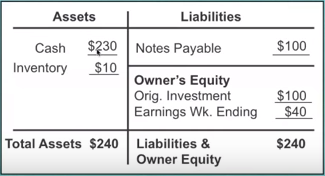Reading: Financial Statements
The
Balance Sheet
•The
Balance Sheet describes a business’s financial situation at a moment in time,
or a snap shot
•The
left side details the assets a business owns
•The
right side details how those assets were acquired (Liabilities + Shareholder
Equity)
Both
sides must always equalHow
Loans Effect a Balance Sheet
•You
need a loan to help fund your business
•The
bank lends you $100 and expects and interest payment of 10%
•A
long term loan that includes interest known as Notes Payable
Two
Types of Owners
•People
the business owes money to (Liabilities)
•The
part of the business the owner owns (Owner’s Equity)
Assets
= Liabilities + Owner’s EquityInventory
and The Balance Sheet
•Inventory
consists of products that you sell.
•When
you buy inventory you decrease the value of your cash.
•$50
of inventory buys you:
- $ 35 for 50 sheets of paper
- $15 in markers and colored pencils
- $ 35 for 50 sheets of paper
- $15 in markers and colored pencils
First
Day in Business
•You
draw 40 caricatures for $2 a piece
•$80
in total sales
•Unit
Cost = Price of inventory to create 1 finished good
- $50 in inventory produces 50 caricatures
- $50 in inventory produces 50 caricatures
•Cost
of Goods Sold ($40) = Units Sold (40) * Unit Cost ($1)
•Gross
Profit ($40) = Sales ($80) – COGS ($40)
Record
First Day on Balance Sheet
•Cash
$230 = Prev. Cash $200 – Inventory $50 + Sales $80
•EWD
$40 = Sales $80 – COGS $40

Time
to Expand
•You
increase your price to $5 per caricature
•Rent
a space at the mall for $80 per day
•Buy
a sign and easel for $50
•Buy
$50 in raw material inventory
Sell
60 caricatures for $300 in salesExplain
the Changes
•Cash
$350 = Prev Cash
$230 – Expenses $130 – Inventory $50 + Sales $300
Earnings
Week Ending $110 = Expenses -$130 – COGS $60 + Sales $300Second
Week in Business
•You
decide to rent the mall booth for 3 days $240
•Spend
$150 on Raw Materials
•Use
$25 of Raw Materials to create Picture Books
•You
sell 125 caricatures, but no picture books
Income
Statement from Weekend
•Remember
to subtract ending inventory
•Move
Net Profit to Earnings Week to Date.
Over
to the Balance Sheet
•Cash
$585 = Prev. Cash $350 – Inventory $150 – Rent $240 + Sales $625
•EWTD
$260 = Sales $625 – COGS $125 – Expenses $240
•Finished
Goods
•Retained
Earnings
One
Last Development
•Friend
offers to buy picture books for $50 on credit (Accounts Receivable)
•Mall
operator wants ½ up front $120 (Pre Paid Expense)
•Check
into Accounts Payable
What
Happens if Debt isn’t Paid
•Remove
amounts in Accounts Receivable
•Delete
the same amount from Earnings Week to Date.
Don’t
touch Retained EarningsÚltima modificación: martes, 14 de agosto de 2018, 08:29
